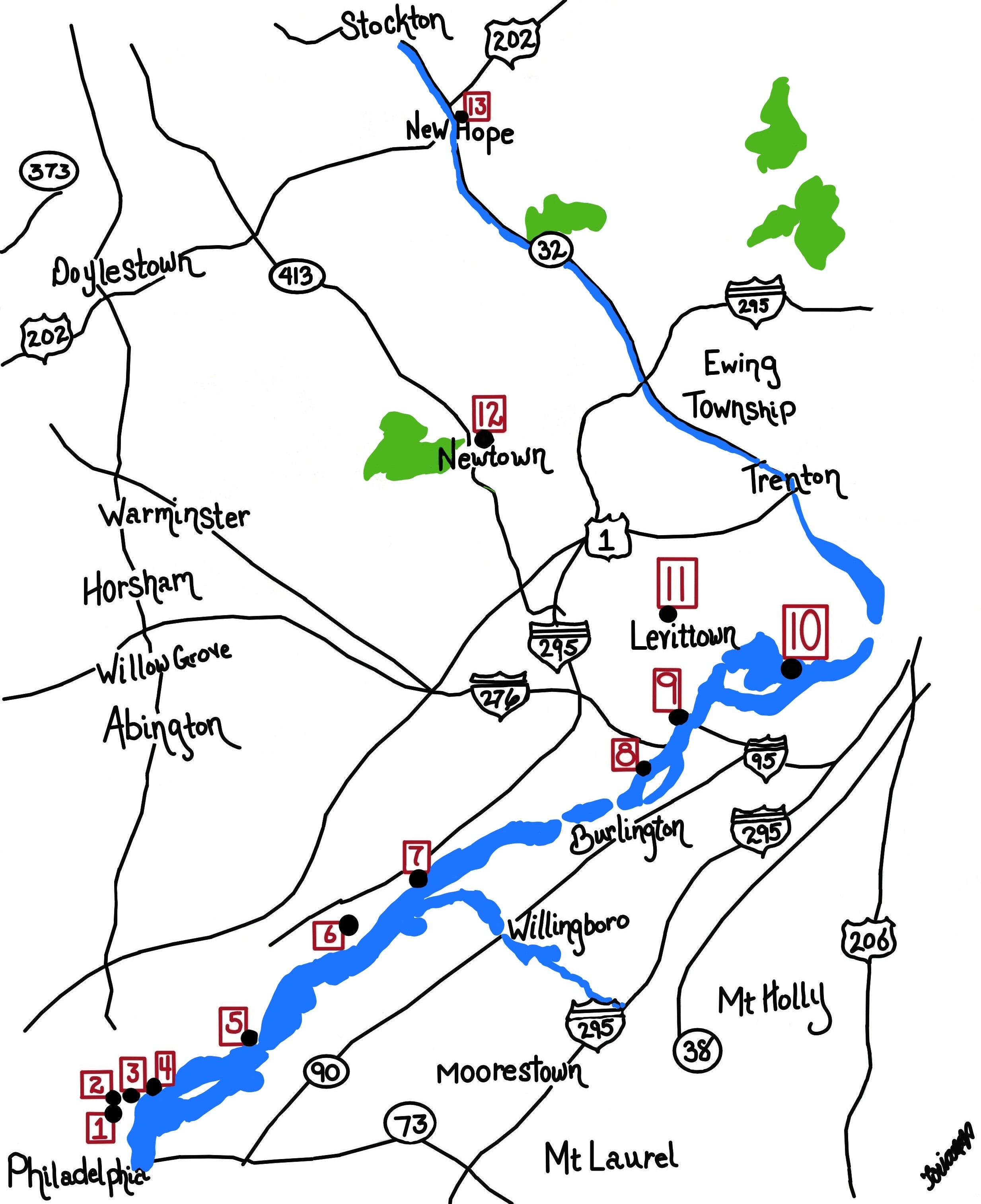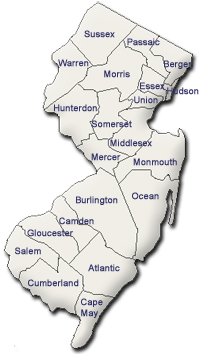Related Topics
Philadelphia's River Region
A concentration of articles around the rivers and wetland in and around Philadelphia, Pennsylvania.

City of Rivers and Rivulets
Philadelphia has always been defined by the waters that surround it.
Nature Preservation
Nature preservation and nature destruction are different parts of an eternal process.
New Jersey (State of)
 The Garden State really has two different states of mind. The motto is Liberty and Prosperity.
The Garden State really has two different states of mind. The motto is Liberty and Prosperity.
Gunk, 27 Million Tons of It

|
| Henry Hudson |
When Henry Hudson reached the mouth of Delaware Bay in 1609, the river was so full of snags he simply went up to what is now the Hudson River in New York rather than try to wiggle his little sailboat up Delaware. By 1900, there had been enough dredging and removal of islands that the channel was 17 feet deep all of the ninety miles up to Philadelphia. One of the consequences was that the new river edge was down at Delaware (Columbus) Avenue, rather than up at Front Street. When you make it deeper, the width of a shallow river often narrows.
Now, the proposal is to deepen the channel to 42 feet, a number mandated by the present size of cargo container ships. Another limiting factor is the construction of the bridges, so the Port of Philadelphia is moving South of the Walt Whitman bridge. That's potentially of great value to the longshoremen who live in that region, although whether it will really bring prosperity is up to them, depending on whether they restrain their aggressive wage and work-rule proposals. There are serious students of the Philadelphia economy who maintain that the economic decline of Philadelphia is more traceable to the intransigence of the longshore unions than to any other factor. Since that comment is specifically made in comparison with the railroad brotherhoods, it is a dramatic accusation indeed.
If you deepen the channel to 42 feet, 800 feet wide (1300 feet at bends in the river), you can be calculated to bring up 27 million tons of sludge. You have to dump that stuff somewhere else, and the current plan is for Philadelphia to build a retaining wall out into the river next to the Packer Avenue terminal area, and dump Philadelphia's share of the stuff behind it. In time, the water will drain out of the gunk, and quite a few acres of dry land would make its appearance. Some engineers question whether the force of the river would permit this. Environmentalists have objections to this project relating to stirring up pollutants lying dormant on the river floor, but without likely effect on the tin ears of those who are presently congratulating themselves on obtaining Federal money to accomplish this "big dig".
The really serious obstructions are coming from the State of New Jersey, which would acquire 9 million tons of gunk as their fair share. Right now, New Jersey is raising taxes and cutting state spending because of a budget deficit, so they are not anxious to take on another big project, particularly one whose benefits will have to be shared with Pennsylvania. Pennsylvania was momentarily sympathetic with this problem until it was learned that New Jersey is actively promoting a FIFTY-foot channel in the Hudson River. Immediately it becomes obvious that there is not enough money for two projects, and there are more New Jersey voters up near the port of New York than down around the Port of Philadelphia. Both New Jersey and Pennsylvania have Democrat governors, while New York has a Republican one. Ordinarily, this would be a decisive point, but the preponderant location of voters up in North Jersey seems to trump that. Keep watching the Saturday papers, on the editorial page down below the fold, the place newspapers ordinarily reserve for retractions, apologies, and local political truths.
What's going on here is attempted exploitation of geographical advantages. Philadelphia is at one of three navigable openings in the Atlantic coast barrier islands adjoining the New York-Washington megalopolis, or five openings if you call it a Boston-Richmond megopolis. Obviously, a seaway opening in the middle is superior to one at the ends, so it really comes down to a New York and Philadelphia competition, with Baltimore a poor third because European ships have to go down to Norfolk and then come come back up the Chesapeake, like Lord Admiral Howe in 1777. There's a huge amount of rail and truck traffic North and South, so crossing the T with ocean traffic arriving in the middle could make quite an economic center. Passenger rail traffic from Philadelphia to Pittsburgh and beyond is pretty anemic, but freight traffic is healthy and could be more so with cargo supplied by container ships. This is the dream, New York is the enemy, New Jersey is the villain, and the longshoremen are the main beneficiary. It is even possible to imagine eighty dollars per hundred in wages for Workman's compensation, but that would be cynical.
Because of the New Jersey problem, proposals have been made to fill up abandoned coal mines with dredging sludge and let the water seep out wherever it, please. Somehow, this isn't thought to be practical, and other suggestions seem to be very welcome, a rather unusual circumstance in itself.
Let's ask ourselves whether we want to return Philadelphia to its old industrial mightiness, or whether we want to encourage the development of a service economy, computers and all that. One way to measure success in the container cargo race is to count the unloading cranes. Philadelphia has about five of them, and most of the time they are sticking straight up, unused. There are many times that many in Seattle, and in Yokohama, there are over a hundred. The port of Kobe has far more, too many to count as you go past on the bullet train. However, there's a secret truth about container ships. When they get to Seattle, there is no cargo to fill them with for a return voyage, and in fact, the empty container pile-up is a rather serious problem. Bill Gates is shipping lots of software to Japan, but it doesn't fill cargo containers, and the economy of the region is going to have high transportation costs until someone figures out a bulk cargo product to ship from Seattle. This is exactly the situation of a century ago when the New York Central, the Baltimore and Ohio, and the Pennsylvania RR were battling it out for transcontinental supremacy. The Pennsy won that battle because oil was discovered in Bradford Pennsylvania, and refineries were built on the Schuylkill to process the oil. The Pennsy had thus found a round-trip cargo for filling its empty East-bound freight cars, and it beat out the other two railroads which didn't. Cheaper freight rates became possible, and therefore other industries prospered in the region.
Right here is a topic which somebody at the Wharton School had better start talking about. No matter how much software and other service industry prosperity a city region may support, it has to find a way to supply bulk cargo to all those container ships that are bringing in the BMW's for the service industry hotshots to drive.
Meanwhile, what does New Jersey do with 9 million tons of gunk?
Originally published: Monday, June 26, 2006; most-recently modified: Tuesday, May 21, 2019